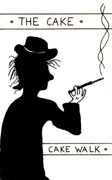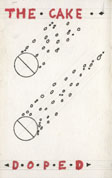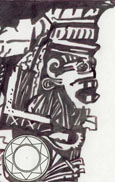
The Cake began with an infantile enthusiasm for traditional Swiss music and cult television shows such as "Monkey" and "Penelope Pitstop". In particular, two episodes of Pitstop were influential: one in which Penelope is incarcerated in a fortune cookie factory and one involving a circus from which early tracks like "It's a Phoney Clyde" and "Happy Death" took their inspiration. The heavy Swiss influence however did not subdue or obscure the radical Avante Garde roots of the music.
1980 saw the official birth of "The Cake". The first ingredient of this vial concoction was the now infamous Prinztronic D125, an unsophisticated piece of machinery which came in to the possession of Jeffrey Webb (then twelve) as a birthday present from his parents. This was pressed into service at Christmas of that year to record improvised "songs" and construct simplistic audio collages from "concrete" materials recorded on location around Littlehampton. These experiments formed the basis of early Cake compositions.
After a sojourn of about thirteen months The Cake was revitalised by the acquisition of more sophisticated recording technology (Ferguson 3T20 and "Heavy Duty" playback equipment from Jack Wilmore) and an "inspirational" visit to West Germany. From this heady period the first album "Cake Walk" was born. At this point influences ranged from Mozart to Kraftwerk but the recordings still largely consisted of Swiss music set against a barrage of electronic bleeps and German language records played back at 16 rpm. Most of the self-written songs, i.e. "Do You Want It?" were very crude and consisted of little more than vocals and piano backed by a metronome; the lyrical content remaining in the same inane vein as earlier works. In general, "Cake Walk" was very much an intellectual exercise combining "stolen" and self-written material in an ad-hoc and nonsensical fashion.

At the end of 1982 came the double album "Mu" which was very similar to "Cake Walk" in style but more cynical in it's outlook, taking a deliberate swipe at MOR music by featuring vary-speeded David Cassidy records (Speedway, Speedway Reprise, Speed Review and Speed II). More notable self-written songs on the album included a long drawn-out saga consisting of "The Discovery of Mu", "Mu" and "Dead Loss in a Storm". The lost continent of Mu was a growing preoccupation with The Cake at the time but would not reach it's expressive ne plus ultra until the lush "MU II" recorded in 1984 and reworked in 1986. Other techniques pioneered on Mu were "budgie cage drumming" and the use of Joey (a budgerigar) as a backing vocalist - I would like to add at this point that there were two budgie cages; one which was used as a drum and one to contain Joey. Mu also spawned a new musical form: "Swiss spoof rapping music", which consisted of the destruction of an item of household furniture executed in time with an arbitrarily chosen Swiss yodeling record.
The cover art for Mu is also worth noting. This depicts a monster in space (an idea drawn from ancient religious concepts) which is supposed to represent the demise of the sun god "Ra", hence it's location in a void. The strong colours on a dark background also provide an amusing visual gimmick. If viewed in semi-darkness the monster face appears to move.

Although the third album "Doped" was started in 1982, work was shelved with only five tracks complete: "Doped", "Virtues and Vices", "Stingray", "Chinatown" and "So I Started to Row". There was no enthusiasm to resume production until mid 1983 when enough tomatoes were picked to finance a Korg MS20 semi-modular analogue synthesizer. In the meantime the band concentrated mainly on inventing equipment and honing their live performances. Once production was again under way results were swift in the coming. Two tracks ("Chinatown" and "So I Started to Row") were dropped and two completely electronic tracks were produced "Safari - Afro Club Version" and "Safari - Bureau Club Version" after which production was again halted until September 1983 because Andrew Scutt reclaimed the amp he had loaned the band. Work continued at a slower pace using a four Ohm speaker plugged into the headphone socket of the Korg. Although these technical constraints hampered the "through the air" dubbing process a further four tracks were produced for side B and Doped was finally released on November 2nd 1983.

Plans for a follow-up to "Doped" were soon under way. This was to be called "Resistance" and was largely inspired by a re-kindling of a long-standing obsession with black and white films. Ideas for numbers were specified and the composing work was embarked upon with gusto - "Golden Years" NLKH1983, "Morning Glory" NLKH1983, "Revolution" NLKH1983, "The Farewell" NL1982, "Storm Warning" NLKH1983 and "The Institution" NLKH1984. However, only one of these compositions ("Storm Warning") was destined to appear on the Resistance album which ended up as Nick Laviers' debut solo project in 1984. Before this happened there was to be one more Cake Album, "The Jungle".
"The Jungle" was the Cake's last work to date - excluding the 1988 compilation "Tales From Heaven". This was the first Album to involve Jeffrey Webb and Daniel Greenstreet to any great degree. There are two versions of this LP: the original 1984 release and a revision that did not appear until 1987. The revised version contained re-workings of "The Circus of Death" (the original, played by Laviers and Webb, was replaced by a completely sequenced track), "Mu II" (a lavish arrangement involving Greenstreet who played on "Mu I") and "Pictures of Back Gardens" (the original minimalist track being replaced by an audio collage). "Fault Line" was completely re-written. The evocative song it became bore no resemblance to the original's complex of overlaid Korg MS20 lines.

Five of the tracks on the original '84 release featured Webb as synthesist. Equipment upgrades in February and March 1984 (Kay Drum Machine, Electric Guitar and Roland SH101) gave the band a completely different sound. Only two tracks, "Mothers by Fathers" and the original "Fault Line", were to use the overdubbing techniques pioneered on "Doped". The rest were sequencer-based and recorded in one take. This record marks a transition in Laviers' focus from experimental music to song writing and is very much in the ethos of New Order's / Heaven 17's early records, mixing out-and-out pop songs with experimental material from a former incarnation.
Following "The Jungle", The Cake lay dormant, re-surfacing from time to time mainly in the guise of the Cake Photographic Society. There was also the odd single here and there, most notably "Flopmatic" in 1985. In 1988, a compilation entitled "Tales from Heaven" was released celebrating the first three Cake albums. This canonic material was supplemented by six hitherto unreleased tracks that pre-dated the band's debut album "Cake Walk" by two years. The tracks, recorded during December 1980 and January 1981, were "I Hate You", "It's a Phoney Birthday", "Happy Death", "A Nasty Man", "Old People's Home" and "In the Dirt". The first four tracks are completely improvised and are the best remaining examples of the "Prinztronic" era. They are also exclusively a capella with Webb singing all of his synthesizer parts. The next two tracks, recorded slightly later, are far closer to "Cake Walk" style-wise featuring piano parts, percussion and electronic instrumentation.

There are four "lost" tracks which were originally recorded in 1982 but subsequently taped-over. These were improvised a capella sketches made by Laviers and Greenstreet around the time when material for "Cake Walk" was being written. This was, in actual fact, the first time Greenstreet played for The Cake although nothing he worked on was released until "Mu" on which he contributed electronics, percussion and backing vocals. From what anyone can remember, the style of the "lost" tracks was a massive departure from anything The Cake had done previously or would do in the future. It displayed a strong punk influence, sounding raucous, maniacal and confrontational. This could have possibly been the germinating seed of a more aggressive style that Laviers and Greenstreet would be seen to adopt in "Magnetism", "Fart Dirk Tit", "Stronger than Reason" and "Incident on Littlehampton Beach" penned long after The Cake had gone to bed for its lengthy hibernation.